Vol 3 No. 9 TROPIC LIGHTNING NEWS February 26, 1968
Index
By LT Bruce Burton
In two weeks of continuous contact, elements of six 25th Inf Div battalions
have killed more than 400 Viet Cong during the fighting in the Cu Chi area.
Battles raged along Highway 1 from the outskirts of Saigon to the north of
the division’s base camp at Cu Chi. Heavy fighting also broke out during the
Tet period from the Ho Bo Woods to Duc Hoa in the northern and southern extremes
of Hau Nghia Province.
Soon after the Viet Cong shattered their declared Tet truce, the 1st and 2nd
Bns, 27th Inf “Wolfhounds” airlifted into the Saigon area to reinforce American
units defending the capital. When it became apparent that more troops would be
needed to handle the string of coordinated attacks along Hau Nghia Province’s
stretch of Highway 1, units were dispatched from the 3rd Bde, 25th Inf Div.
Both the 3rd Bn, 22nd Inf and the 2nd Bn, 12th Inf came in heavy contact
within hours of arriving under 2nd Bde control at Cu Chi.
The 1st Bde’s 4th Bn (Mech), 23rd Inf already under the operational control
of the 2nd Bde on a land clearing operation in the Ho Bo Woods, also saw heavy
action in the Viet Cong Tet offensive.
The 2nd Bn, 27th Inf airlifted into Tan Son Nhut Air Base where the 3rd Sqdn,
4th Cav was repulsing a massive enemy assault. The “Wolfhound” battalion set up
a base nearby and began to battle enemy units poised to strike at the Tan Son
Nhut military complex and at the capital.
Also on January 31, an ambush patrol from the 1st Bn, 27th Inf killed 15 Viet
Cong and captured a 75mm recoilless rifle. Reinforcements from the battalion’s
forward base at Duc Hoa killed 22 more and captured a second 75mm recoilless
rifle.
Three companies made heliborne assaults into the Saigon suburb of Hoc Mon,
which the Viet Cong had overrun the night before. The American force
immediately began clearing operations.
In the early stages of the fighting around Cu Chi, the 3rd Bn, 22nd Inf and
the 4th Bn (Mech), 23rd Inf bore the brunt of the action.
Within days, however, the 2nd Bn, 12th Inf also became fixed in a continuous
struggle to push entrenched Viet Cong from two villages to the east of the Cu
Chi base camp.
Early on the morning of February 1, the ARVN Cu Chi subsector reported it was
under attack by an estimated Viet Cong battalion.
The reconnaissance platoon of the 4th Bn (Mech), 23rd Inf led a company of
the 3rd Bn, 22nd Inf in a daring charge through heavy enemy automatic weapons
and recoilless rifle fire to relieve the burning sub-sector compound.
(Continued on Back Page)
| AFTERMATH OF THE BATTLE - A US Infantryman examines the remains of a hut which an hour before had been used by a Viet Cong sniper. The action took place in the village of Hoc Mon where the 1st Bn, 27th Inf battled the VC who had occupied the village. (Photo by SP4 B. Roessler) |
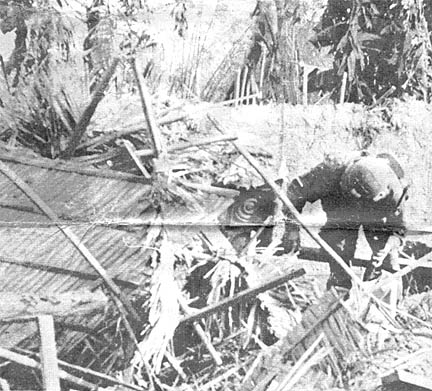 |
Manchus Help VC Hit Village
1ST BDE - Ninh Than, a village of 4000 people five miles east of Tay Ninh
City was mortared recently by the Viet Cong.
Hours after the attack, the village chief requested aid from the 25th Div’s
4th Bn, 9th Inf.
“Fifteen families were burned out and many buildings partially destroyed,”
said 2LT Alfred Saxe, battalion civil affairs officers. “The worst part of it
was the people themselves. They were badly shaken and in desperate need of
help.”
Saxe stated that within hours, he and his section delivered 300 pounds of
food and all available building materials to the stricken villagers.
Second Brigade Force Fights In, Around Saigon
By LT Bruce Burton
A task force of three 2nd Bde, 25th Inf Div battalions reinforced by cavalry
and artillery has killed more than 700 Viet Cong in the fighting around Saigon.
The task force, under operational control of the 3rd Bde, has been engaged in
heavy fighting near the capital since January 31.
Viet Cong casualties were expected to rise as the U.S. units encountered
almost daily enemy resistance in the area northwest of the capital.
The task force is composed of the 1st and 2nd Bns, 27th Inf. “Wolfhounds,”
and elements of the 1st Bn (Mech), 5th Inf, the 3rd Sqdn, 4th Cav and the 1st Bn,
8th Arty.
Fierce battles erupted in metropolitan Saigon on January 31, when an
estimated 20 battalions of Viet Cong occupied the capital and virtually every
major community ringing it.
The first 25th Div unit to react was the 3rd Sqdn, 4th Cav, which charged
down Highway 1 from Cu Chi early on the morning of January 31 to halt an attack
on Tan Son Nhut Air Base.
The cavalry unit counterattacked down the main runway at the huge American
installation, overrunning the retreating enemy despite heavy automatic weapons,
rocket and mortar fire.
The Tropic Lightning unit was credited with killing 292 communists in the
fight, which finally abated the next day.
At the same time the cavalry was beginning to drive off the Viet Cong
penetration, the 2nd Bn, 27th Inf airlifted into Tan Son Nhut.
(Continued on Back Page)
Page 2 TROPIC LIGHTNING NEWS February 26, 1968
Decorated
| SILVER STAR | |
| SP4 Joseph T. Hurrigan | |
|
BRONZE STAR (HEROISM) |
|
| CPT Donny L. Holland Co B, 4th Bn (Mech), 23rd Inf | CPT Carl M. Hirsch, HHC, 25th Inf Div |
|
BRONZE STAR (MERIT) |
|
|
LTC Thomas U. Harrold, HHC, 3rd Bn, 22nd Inf LTC Allen T. Lindholm, Hq, 2nd Bn, 77th Arty LTC William L. Albright, HO, 25th Inf Div Arty LTC John G. Pappageorge, HHC, 3rd Bde, 25th Inf Div MAJ Edward V. Kelly, HHC, 25th Inf Div MAJ James F. Kelly, HHC, 2nd Bn, 27th Inf MAJ James A. Peterman, HHC, 1st Bde, 25th Inf Div MAJ John Hamilton, HHC, 4th Bn, 9th Inf MAJ Robert M. Brumback, HHC, 2nd Bn (Mech), 22nd Inf MAJ Billy J. Hallmark, HHC, 25th Inf Div MAJ Maxine Douglas, 12th Evac Hosp (SMBL) MAJ Ethel B. La Rock, 12th Evac Hosp (SMBL) MAJ Helen J. Senderowicz, 12th Evac Hosp (SMBL) MAJ William B. Garland Jr., HO & Co A, 25th Med Bn MAJ William H. Randolph, HO & Svc Btry, 2nd Bn, 77th Arty MAJ Wilbur Farlow, HHC, 25th Inf Div CPT Pattye M. Lawrence, 12th Evac Hosp (SMBL) CPT Thomas H. Fickle, Co B, 25th Avn Bn CPT Douglas D. Humphries, HH&S Btry, 1st Bn, 8th Arty CPT Ray E. Mc Coy, HHC, 25th S&T BN CPT Roger J. Sullivan, HHD, 125th Sig Bn CPT Donald A. Tapscott, Co B, 4th Bn (Mech), 23rd Inf CPT Michael T. lodice, Co D, 25th Med Bn CPT Claude J. Benner Jr., HHC, 1st Bde CPT Francis J. Stephenson, Trp D, 3rd Sqdn, 4th Cav CPT Charles P. Watkins, HHC, 1st Bn (Mech), 5th Inf CPT Lance Warner, Co B, 1st Bn, (Mech), 5th Inf CPT William A. Wilde, D Trp, 3rd Sqdn, 4th Cav 1LT William M. Churchill, Co A, 65th Engr Bn 1LT Joseph M. Manna, Co E, 65th Engr Bn 1LT William H. Paulson, A Btry, 1st Bn, 8th Arty 1LT David A. Tuckner, 25th Admin Co 1LT David A. Van Tesloc, Co A, 2nd Bn, 34th Armor 1LT Robert A. Blythe, HO, Btry, 3rd Bn, 13th Arty 1LT Broadus E. Willingham, Svc Btry, 6th Bn, 77th Arty 1LT Sterling D. Hammond, HHT, 3rd Sqdn, 4th Cav 1LT Chris H. Archer, HHC, 2nd Bde 1LT Gary J. Armstrong, Co D, 725th Maint Bn 1LT John C. Thompson, HHT, 3rd Sqdn, 4th Cav 1LT Thomas L. Demakes, 25th S&T Co (Prov) |
SGM Cecil F. Fors, HHB, 25th Inf Div Arty SGM Victor A. Hansen, HHC, 3rd Bde SGM James D. Vaughan, HHC & Band 1SG Arthur F. Lyman, C Btry, 1st Bn, 8th Arty 1SG Russell S. Peterson, HQ & Co A, 725th Maint Co MSG Lee L. Skowronek, HHC, 65th Engr Bn MSG Billy J. Culp, HHD, 25th Avn Bn MSG Billy Pierce, HHC, 4th Bn (Mech), 23rd Inf MSG Leonard Sprankle, HHT, 3rd Sqdn, 4th Cav SFC Robert L. Black, HHB, 25th Inf Div Arty SFC Norman T. Skowronski, HQ & Co A, 25th Med Bn SFC Felicisimo A. Camba, HHC, 2nd Bn, 14th Inf SFC Raymond E. Levine, 25th Admin Co SSG David G. Wilkinson, 25th Admin Co SP6 Kerry K. Bradshaw, 25th Admin Co SSG Charlie Collier Jr., Co B, 125th Sig Bn SSG Ronald Podlas, Co A, 125th Sig Bn SP5 Martin W. Czeider, HHC, 25th Inf Div SP5 Arthur J. Haber, HHC, 25th Inf Div SP5 Donald G. Martin, Trp B, 3rd Sqdn, 4th Cav SP5 Gerhard H. Pulver, Co C, 725th Maint Bn SP5 Daniel E. Walsh, HHT, 3rd Sqdn, 4th Cav SP5 James H. Windham, HHT, 3rd Sqdn, 4th Cav SGT Thomas E. Fagen, LRRP Det, 3rd Sqdn, 4th Cav SGT George Peterson, B Btry, 7th Bn, 11th Arty SGT William Rhodes, Co B, 25th S&T Bn SGT Ronald L. Ballesteros, HHC, 2nd Bde SP5 Elliot L. Hoskins, HHC, 1st Bn (Mech), 5th Inf SGT John O’Rourke, HHT, 3rd Sqdn, 4th Cav SP4 Eugene Daly, HHC, 2nd Bn, 27th Inf SP4 Clarence P. Manning, HHC, 2nd Bn, 27th Inf SP4 Steven A. Moore, HHC, 1st Bde SP4 Jerry L. Baker, HHC, 1st Bn, 27th Inf CPL Wilehaldo Covarrubias, C Btry, 1st Bn, 8th Arty CPL Jimmy N. Hicks, C Btry, 1st Bn, 8th Arty SP4 Jean M. Katzias, Svc Btry, 6th Bn, 77th Arty SP4 John T. Tim, HQ, 1st Bn, 8th Arty SP4 Antonio Stamborski, HQ Btry, 1st Bn, 8th Arty SP4 Robert E. Tyler, 25th Admin Co |
|
The CIB The AG Section The Combat Infantryman Badge (CIB) is designed to distinguish the infantryman
from other soldiers and to recognize his service as our basic fighting man in
combat. |
Combined Federal Campaign
This is a message from Secretary of Defense McNamara concerning this year’s
Combined Federal Campaign.
“This single appeal gives all Department of Defense personnel, both military
and civilian, located at DoD overseas activities, a unique opportunity to pledge
through the payroll allotment system their individual citizen’s share of
contributions needed to support national and international health, welfare and
social service agencies. These agencies, among the many programs they conduct,
contribute materially to military morale and welfare at home and overseas,
better national health conditions through research and individual assistance and
stronger bonds of international friendship through voluntary aid to many people
in other countries who are hungry and destitute. They merit personal support
from us, both as citizens and as Department of Defense personnel.
“It is requested that each addressee join with me to make this appeal a
complete success by urging all military and civilian personnel in your
department, agency or command who are located overseas to demonstrate that the
basic needs of these voluntary agencies can be adequately fulfilled through a
single solicitation by making a generous gift or pledge during the forthcoming
campaign. Through a successful combined campaign we will meet the needs of the
voluntary agencies and the people who depend upon them for help, while at the
same time, through a one-time campaign for all groups instead of separate
campaigns, we will be supporting the President’s program to achieve economy in
Government operations.
“An organized on-the-job solicitation will not be conducted during this
campaign among U.S. DoD military and civilian personnel located in South
Vietnam. However, any unsolicited contributions these personnel may make
voluntarily will be gratefully appreciated by the recipient voluntary agencies.”
The TROPIC LIGHTNING NEWS is an authorized publication of the 25th
Infantry Division. It is published weekly for all division units in the Republic of
Vietnam by the Information Office, 25th Infantry Division, APO San Francisco
96225. Army News Features, Army Photo Features, Armed Forces Press Service and Armed
Forces News Bureau material are used. Views and opinions expressed are not necessarily
those of the Department of the Army. Printed in Tokyo, Japan, by Pacific Stars and
Stripes.
MG F. K. Mearns . . . . . . . . . Commanding General
MAJ Bernard S. Rhees . . . . Information Officer
SP5 Terry Richard . . . . . . . . . Editor
SP4 Dave Cushman . . . . . . . Editorial Assistant
Page 3 TROPIC LIGHTNING NEWS February 26, 1968
|
From Tet to Valentine’s Day |
 |
| MAP OF FIGHTING FOR TASK FORCES OF THE 2ND AND 3RD BDES, 25TH INF DIV, FROM JANUARY 31 TO FEBRUARY 14. THE CHART SHOWS GENERAL DIRECTIONS OF ATTACK AND GENERAL LOCATIONS OF ACTIONS ONLY. (MAP BY LT BRUCE BURTON) |
Page 4-5 TROPIC LIGHTNING NEWS February 26, 1968
25th MPs – Check, Search, Guard, Befriend
For any large number of people to work and live together harmoniously, it
is understood that certain laws and regulations must be enforced. In civilian
life this job belongs to police departments. In the Army, the law enforcing
task is handled by military police units.
In Vietnam, the law enforcing role of the military policeman is expanded
somewhat beyond the type-cast duties normally associated with military police
work.
Serving the 25th Inf Div is the 25th Military Police Co Commanded by CPT
Lewis B. Metts Jr., of Spencer, N.C. The 25th MP Company is under the control
of LTC William J. McClain, the division’s Provost Marshal. The company,
consisting of four military police platoons and a security platoon, operates
under the motto, “Of the troops - for the troops.”
Among the expanded duties of the MP’s at Cu Chi base camp are providing road
security along roads within the division, investigating black market operations
in local towns, guarding the division Detainee Collecting Point, and controlling
the flow of Vietnamese laborers entering and leaving the base camp. On many
operations the MPs work closely with the national police and Vietnamese Military
Police.
Also included within the daily duties of the MPs are controlling military
traffic, supporting the combat and support command units, enforcing military
laws and regulations, investigating crimes, and protecting the thousands of
soldiers of the division.
|
PHOTOS AND STORY |
 |
| MP’S OF THE 25TH MILITARY POLICE COMPANY AND VIETNAMESE NATIONAL POLICE SEARCH A CIVILIAN BUS FOR HIDDEN WEAPONS AND EXPLOSIVES ON HIGHWAY 1. |
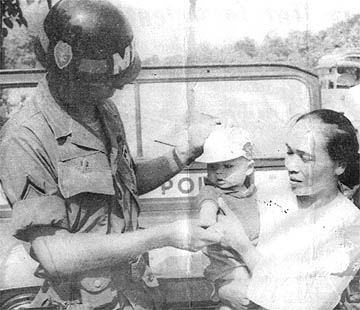 |
PFC STEPHEN L. LARSON, SAN LEANDRO, CALIF., PAUSES FROM PATROL DUTIES TO PLAY WITH A VIETNAMESE CHILD NEAR CU CHI. |
| SP4 JAMES HENRY CHECKS PASSES AT THE MAIN GATE OF THE BASE CAMP. |
 |
 |
SP4 DON SIEGLER STANDS GUARD IN A TOWER OVERLOOKING THE DIVISION DETAINEE COLLECTING POINT AT THE CU CHI BASE CAMP. |
| SP4 HARLAND D. GUFFEY, GARDEN CITY, MICH., CHECKS INSIDE VEHICLE FOR CONCEALED WEAPONS AND EXPLOSIVES. |
 |
Page 6 TROPIC LIGHTNING NEWS February 26, 1968
 |
RETURNING ENEMY FIRE - Crewman of a 2nd Bn, 22nd Inf, APC pour 50-cal. and M-60 machine gun fire into a Viet Cong position in War Zone C, during Operation “Yellowstone.” (Photo by PFC Richard Davis) |
$200 Limit Begins In Just Four Days
LONG BINH, (USARV-IO) - A $200 limitation per month on personal currency
transactions involving Military Payment Certificate (MPC) cash will go into
effect throughout Vietnam starting March 1.
After this date, it will no longer be possible to send postal money orders,
Treasury checks, or Traveler’s checks home in excess of $200 per month. Nor
will it be possible to conduct cash transactions involving MPC cash in excess of
the $200 monthly limitation.
In addition, purchase from the Vietnam Regional Exchange on cameras, TV’s,
tape recorders, tuner amplifiers, refrigerators, fans, radios, airline tickets
and automobiles will be regulated. MACV Form 385 will be required to make
these purchases. This form will be the means through which PX purchases on
these items will be monitored.
Once the entire plan has gone into effect, a computer will be keeping account
of the cash transactions of every individual in Vietnam. Each person will have
a record kept, and when violations of the $200 limitation are discovered, that
individual will be reported to his provost marshal.
Why is this change being established? The Vietnamese government and the
Military Assistance Command, Vietnam (MACV), have agreed that measures must be
taken to limit black market activity in Vietnam. A monthly limit on cash
transactions, plus a close system of scrutiny of purchases will help achieve
this goal.
There will be exceptions to this new plan. When you leave Vietnam for CONUS,
R&R, or leave, you will be allowed to convert as much cash as you have,
regardless of the $200 limitation.
In addition, if your pay is deposited by your finance section into a checking
account, the checks you write will not come under the $200 limitation. Cash
deposits into an account, however, will.
Finally, in cases of personal emergency, your commander may authorize you to
conduct cash transactions for more than $200.
What should a person do to avoid being stuck with a bundle of cash he can no
longer send home by personal money order?
(1) He can utilize the Class “E” allotment, through which a portion of his
pay is deducted and sent home.
(2) He can have his pay sent to a checking account by his finance officer.
(3) He can have his finance officer send a check for him.
It is important that each individual take the necessary steps to avoid being
caught with more cash on hand than he has use for.
Wandering Wallet
3RD BDE - Finding a wallet in the jungle that had been lost two months ago
and 35 kms away, sounds unbelievable.
But just such an oddity happened to PFC John J. Foster. The soldier from
Charlie Co, 3rd Bn, 22nd Inf, had lost his billfold when wounded on an operation
south of Dau Tieng.
Two months later, as Charlie Co was sweeping through a Viet Cong base camp
near Cu Chi, the wallet was discovered in a large bunker.
Malaria Memo
Your weekly chloroquine-primaquine tablet is one of the surest ways to
prevent malaria. Don’t forget it.
Page 7 TROPIC LIGHTNING NEWS February 26, 1968
Around The Clock
'Try Harder'
By SP4 Phillips
TAY NINH - The helicopter plays one of the most vital roles of any single
piece of equipment now in use in the Republic of Vietnam. With the helicopter,
men and supplies are moved in a matter of minutes as compared to the hours or
even days which would otherwise be required.
Full Time Job
The job of keeping this important air arm operating is also one of the most
demanding. To the men of the maintenance section of the 3rd Sqdn, 17th Air Cav,
this effort takes on the proportions of a full-time job. Whether it be
performing the regular, everyday functions required to keep the aircraft flyable
or repairing battle-damaged ships, the men, under the supervision of MAJ Richard
H. Seignious of San Diego, Calif, Squadron Maintenance Officer, work dutifully
around-the-clock to keep the vital backbone of the unit in exceptional operating
condition.
This requires keeping thousands of dollars of aircraft and armament in top
working order so the ships may be ready to lift into action at a moment’s
notice. Every ship is checked to secure safety and reliability, as the craft
spend many long hours in the air daily. A great number of these flights are in
support of 25th Inf Div units engaged in “Operation Yellowstone.”
Long Hours
“It is a job that requires long hours and a lot of hard, dedicated work,”
remarked one member of the maintenance section. “But we feel that we are a
number one outfit, doing a number one job.”
While in their own minds the men feel they are number one, their attitude and
working ability seems to indicate that they borrow a phrase from a famous
advertising campaign: “we’re trying harder.”
 |
ON DISPLAY - MAJ Walter Kennett Jr, intelligence officer for the 2nd Bde examines two 75mm recoilless rifles captured during an Operation “Saratoga” action 10 miles northwest of Saigon. (Photo by LT Bruce Burton) |
Help Strengthen The Dollar
Recent national and international events have spotlighted the economic
problems of the United States and the world.
At home, according to the president and the leading economists of the nation,
we face a potential spiral of inflation and further reduction of the dollar’s
purchasing power.
From all indications, the U.S. and its citizens are going to experience a
period of economic readjustment during which the people are going to have to
decide what must be done to strengthen the dollar of an economy that has just, for the first time in
history, achieved a Gross National Product (GNP) of more than $800 million
annually.
It is a meaningless event unless all America acts to halt inflation and to
strengthen the dollar. Those of us in Vietnam play a role. The war here is
costing us $30 billion a year. Our dollar is linked to the piaster. Regardless
of which currency we use, piasters or dollars, we need to make sure we are
spending them wisely. We need to insure that we get full value for every dime
spent. We need to buy only what we need, to save in every way we can and to
budget carefully in those areas that lend themselves to reckless spending.
It is no easy task and there is no easy way to accomplish it, except by
giving the subject of combating inflation our attention each and every day and
in all areas of our operations here. (MACV)
This Prescription Brings Big Smiles
2ND BDE - Medics from the 2nd Bn, 27th Inf “Wolfhounds,” are using a new type
of medication that CPT Peter Elson feels will cure all ills.
Nine-year-old Phan Van Chung showed up at a Medical Civic Action Program (MEDCAP)
in a little village in northern Hau Nghia Province, with a badly infected foot.
Elson, the battalion civil affairs officer, took the boy to the 25th Div’s
base camp for treatment. According to Elson, there was no room in the hospital
for the boy, so he was taken to the battalion’s aid station.
The treatment was described as medication, a haircut, a new set of clothes,
several games, four movies and a new bicycle.
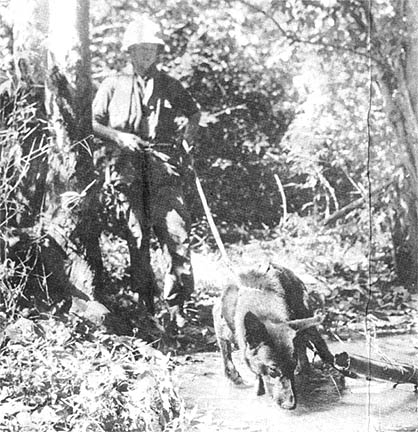 |
THE PAUSE THAT REFRESHES - SP4 David Weiss of the 38th Sct Dog Plt lets his dog take a well earned drink during a lull in a mission in War Zone C, where the 25th Div is conducting Operation “Yellowstone.” (Photo by SP4 John Seymour) |
| DAWN ATTACK - Early morning ground mist partially obscures the target zone, as helicopters carry infantrymen from the 2nd Bn, 27th Inf, towards their landing zone on the Oriental River, during Operation “Saratoga.” (Photo by SP4 Joe Carey) | 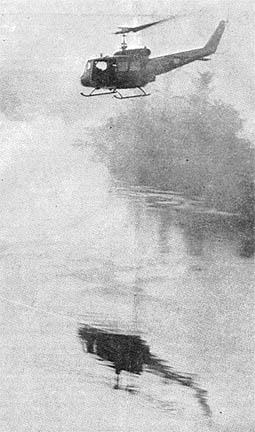 |
Page 8 TROPIC LIGHTNING NEWS February 26, 1968
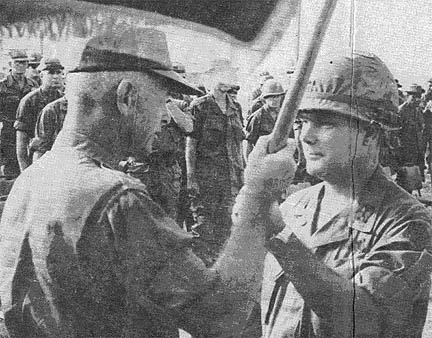 |
COL George F. Hoge accepts the colors of the 25th Inf Div’s 2nd Bde from
MG F. K. Mearns, Commanding General of the 25th. Hoge took over from COL Edwin W. Emerson of DeLand, Fla., who has been assigned to the Advanced Study Group, Carlisle Barracks, Pa. A 1945 graduate of the United States Military Academy at West Point, Hoge came to the 25th from the Combat Developments Command at Army headquarters, Long Binh. The airborne-qualified armor officer has served with a variety of armor and armored cavalry units in Korea, Germany and the United States. In addition, he has been a tactics instructor at the Artillery School and at West Point. |
Second Brigade Task force...
Searching the next day through the enemy’s staging area for the attack, the
“Wolfhounds” uncovered two weapon caches containing a total of 70 small arms, 20
automatic weapons, a wheel-mounted .30-caliber machine gun, 12 cases of
ammunition, three RPG rocket launchers and four radios.
The 1st Bn, 27th Inf also moved into the capital district from their forward
location at Duc Hoa. The unit set up a base camp in the outskirts of Hoc Mon, a
large suburb of Saigon which had been overrun the night before. It was to be
the scene of bloody fighting in the next two weeks.
Bolstered by elements of the 1st Bn, 8th Arty, the Wolfhounds entered Hoc Mon
the next day, but met only light resistance as they pushed the Viet Cong from
the town.
Although the fighting varied in intensity, contact occurred almost daily as
the two Wolfhound battalions and the Cav swept through the heavily populated
area northwest of the capital.
On February 5, elements of the 1st Bn, 27th Inf skirmished an unknown size
enemy force, killing 27 and capturing one heavy and three light machine guns,
10,000 rounds of small arms ammunition and 70 mortar rounds.
Three days later, a security force guarding the Hoc Mon Bridge, a vital
link between Hoc Mon and points north along Highway 1, discovered a Viet Cong
demolition team swimming towards the bridge.
The American and Vietnamese force opened fire, driving off the enemy. They
also destroyed a 50-lb. satchel charge which the enemy had attached to the
bridge but failed to detonate.
The same night, a 20-man patrol of the 2nd Wolfhounds set up a hasty ambush
when they spotted a company of Viet Cong moving towards them across a cemetery.
The Hounds opened fire with small arms, automatic weapons and grenades,
killing 35 enemy in the three-minute action. There were no American casualties.
Some of the heaviest fighting of the two-week period erupted on February 9,
as elements of both 27th Inf battalions and the 4th Cav fought entrenched Viet
Cong around Hoc Mon.
On the northern edge of the village, two companies of the 1st Bn, 27th Inf, a
company from the 2nd Bn, 27th Inf and Delta Troop, 3rd Sqdn, 4th Cav fought a
six-hour battle that lasted until nightfall.
The combined units killed 176 Viet Cong, captured three .50-caliber machine
guns, 20 automatic weapons, 15 RPG-2 rocket launchers and 50 RPG-2 rounds.
Air strikes, artillery and armed helicopters blazed away at the enemy
positions in support of the ground troops.
Two kilometers to the east, two companies of the 2nd Bn, 27th Inf were locked
in battle with a large enemy force. Fighting until dark, the infantrymen killed
102 enemy, and were supported by tactical air strikes, artillery and gunships.
The following day, Hoc Mon again became the scene of heavy fighting, when two
troops of the 4th Cav and elements of the 1st Bn “Wolfhounds” cornered an enemy
unit on the western edge of the village.
Supported by gunships, artillery and tactical air strikes, the combined force
killed at least 105 enemy and captured six automatic weapons, as well as four
RPG rocket launchers.
Late in the second week of the fighting, elements of the 1st Bn (Mech), 5th
Inf joined the task force. The 2nd Bde unit which had moved into the Hoc Mon
area after participating in Operation Yellowstone, encountered only light
contact.
‘Regulars’ Are Really Regulars
3RD BDE - Few units in the 25th Div can boast of having four enlisted men
with a total time of over six years in country. Even more unusual is the fact
that one platoon attached to the 3rd Bn, 22nd Inf “Regulars” has four such men.
Among the NCO’s of the 44th Sct Dog Plt, four are working on their second or
third tour in Vietnam. SSG James M. Selix from Colorado Springs, Colo., has
been here for 21 months. SSG Daniel D. Barnett from Crossville, Tenn., is the
senior member with 25 months. SSG Gary G. Coonrod from Manly, Iowa, has spent
18 months in country, and Sgt Roger C. Jones from Joplin, Mo., has spent 14.
Even though three of the men have received purple hearts, all four have
extended again. Their main reason for staying with the Scout Dogs was the
work. “We just like the job we’re doing,” explained Selix.
As the new teams of dog handlers arrive at the platoon in Dau Tieng, they
will have the rare opportunity to find several veterans who can provide valuable
instruction gained from many years of Vietnam experience.
From Cu Chi To Saigon
(Continued From Page 1)
At daylight, three more companies of the 22nd Inf joined the fight in a
three-pronged attack into the village of Cu Chi. Street-fighting raged for five
hours until the enemy force abandoned the village. The enemy unit, identified
as the 1st Bn, MR IV Main Force Regiment, suffered at least 12 killed, five
weapons lost and 21 personnel detained.
The fighting in Tan Phu Trung and Ap Cho, neighboring villages along Highway
1 less than 10 kilometers from Cu Chi, began January 31 when the 3rd Bn, 22nd
Inf moved in to clear two enemy companies blocking the road.
In almost five hours of continuous contact, the infantrymen killed 17 enemy.
The Viet Cong unit, believed to be from the 272nd Regiment, appeared to withdraw
from the village.
Two days later, however, fighting again erupted in the two communities, this
time as a truck convoy attempted to pass through from Saigon to Cu Chi.
While the convoy waited three kilometers to the south, a company from the 4th
Bn (Mech), 23rd Inf and elements of the 3rd Bn, 22nd Inf fought their way into
the town.
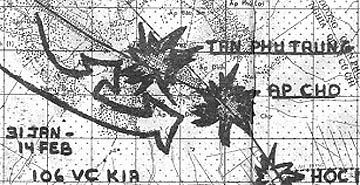 Although the 3rd Bde battalion has borne the majority of the action in Ap Cho
and Tan Phu Trung, elements of the 3rd Sqdn, 4th Cav, Alpha Co, 2nd Bn, 34th
Armor; and the 4th Bn (Mech), 23rd Inf have assisted the 22nd Inf in its
attempts to drive through the enemy fortifications.
Although the 3rd Bde battalion has borne the majority of the action in Ap Cho
and Tan Phu Trung, elements of the 3rd Sqdn, 4th Cav, Alpha Co, 2nd Bn, 34th
Armor; and the 4th Bn (Mech), 23rd Inf have assisted the 22nd Inf in its
attempts to drive through the enemy fortifications.
So far, at least 106 Viet Cong have died in the American assaults on their
fortifications, lost six individual and two crew served weapons and several
personnel detained.
The 2nd Bn, 12th Inf killed at least 115 Viet Cong in the battle to clear
Highway 8A at Tan Hoa, and in action between there and an Phu Trung, six
kilometers to the south.
Also faced with Viet Cong entrenched in reinforced concrete bunkers, the 3rd
Bde unit fought against elements of an estimated two battalions of the 272nd
Viet Cong Regiment.
Although the American unit had faced sporadic contact shortly after it
airlifted into the Cu Chi area, its first significant contact came on February
5, when it killed 33 Viet Cong who had dug in at the hamlet of Phuoc Hung.
The following day, the infantrymen moved north in an attempt to drive through
the village of Tan Hoa. Like the action along Highway 1, the fighting has raged
ever since.
On February 6, a company of the battalion killed 22 Viet Cong who had opened
fire with small arms, machine guns and rockets. Artillery fire from Cu Chi and
armed helicopters supported the troops in their assault.
Air Force fighter bombers dumped thousands of pounds of explosives onto the
enemy fortifications during the eight-day battle.
Although the U.S. troops several times penetrated the enemy defenses and
captured several automatic and crew-served weapons, the Viet Cong force has
continued to resist with heavy fire all attempts to break through the town.
In other actions throughout the province, the 4th Bn (Mech), 23rd Inf killed
24 Viet Cong and captured one RPG-2 rocket launcher in a five-hour fight in the
Ho Bo Woods.
Throughout the two-week period, tactical air strikes accounted for 35 Viet
Cong killed, artillery 30, and helicopter gunships 25 enemy killed.
Two kilometers to the east, two companies of the 2nd Bn, 27th Inf were locked
in battle with a large enemy force. Fighting until dark, the infantrymen killed
102 enemy, and were supported by tactical air strikes, artillery and gunships.
Thanks to:
Dan Tofflemire, 4th Bn. (Mech), 23rd Inf,
for sharing this issue,
Gary Hartt, 2nd Bn. (Mech), 22nd Inf., for finding this issue
Kirk Ramsey, 2nd Bn., 14th Inf. for creating this page.
This page last modified 12-27-2005
©2005 25th Infantry Division Association. All rights reserved.